
The United Arab Emirates Armed Forces are the armed forces of the United Arab Emirates. They consist of the UAE Army, UAE Navy, UAE Air Force, UAE Presidential Guard, UAE Joint Aviation Command, and the UAE National Guard.
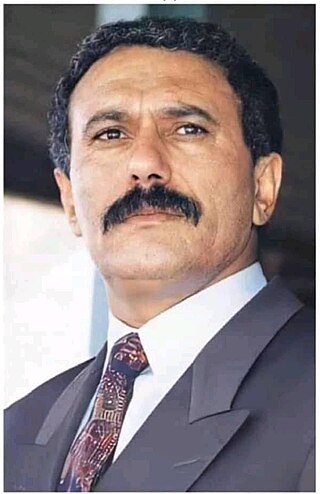
Ali Abdullah Saleh Affash was a Yemeni military officer and politician who served as the first president of the Republic of Yemen from the Yemeni unification in 1990 until his resignation in 2012, following the Yemeni revolution. Previously, he had served as the fourth and last President of the Yemen Arab Republic, from July 1978 to 22 May 1990, after the assassination of President Ahmad al-Ghashmi. al-Ghashmi had earlier appointed Saleh as military governor in Taiz.
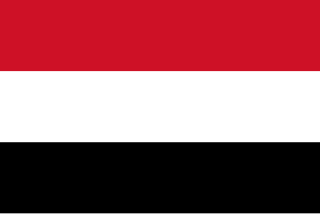
Yemen, officially the Republic of Yemen, is a country in West Asia. Located in southern Arabia, it borders Saudi Arabia to the north, Oman to the northeast, the Red Sea to the west, and the Indian Ocean to the south, sharing maritime borders with Eritrea, Djibouti and Somalia across the Horn of Africa. Covering roughly 455,000 square kilometres, with a coastline of approximately 2,000 kilometres, Yemen is the second largest country on the Arabian Peninsula. Sanaa is its constitutional capital and largest city. Yemen's estimated population is 34.7 million, mostly Arab Muslims. It is a member of the Arab League, the United Nations, the Non-Aligned Movement and the Organisation of Islamic Cooperation.

Socotra or Saqatri is an island in the Indian Ocean part of Yemen. Lying between the Guardafui Channel and the Arabian Sea and near major shipping routes, Socotra is the largest of the six islands in the Socotra archipelago, which since 2013 constitutes one of Yemen's governorates.
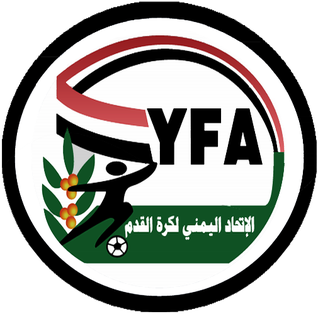
The Yemen national football team represents Yemen in men's international football and is administered by the Yemen Football Association.

Salman bin Abdulaziz Al Saud has been King of Saudi Arabia since 2015, and was Prime Minister of Saudi Arabia from 2015 to 2022. The 25th son of King Abdulaziz, the founder of Saudi Arabia, he assumed the throne on 23 January 2015. Prior to his accession, he was Crown Prince of Saudi Arabia from 18 June 2012 to 23 January 2015. Salman is the third oldest living head of state, the oldest living monarch, and Saudi Arabia's first head of state born after the unification of Saudi Arabia. He has a reported personal wealth of at least $18 billion, which makes him the third wealthiest royal in the world.

The House of Representatives is the lower house of the Parliament of Yemen. It shares the legislative power with the Shura Council, the upper house. The Assembly of Representatives has 301 members, elected for a six-year term in single-seat constituencies. It is one of the rare parliamentary chambers in the world to currently have no female representation.

Mandi is a traditional dish that originated from the Hadhramaut region in Yemen. It consists mainly of meat and rice with a blend of spices, and is cooked in a pit. It is consumed in most areas of the Arabian Peninsula and also found in Egypt, Hyderabad Deccan, the Levant, Turkey, Kerala and Southeast Asia.

Al-Qaeda in the Arabian Peninsula, or AQAP is a Sunni Islamist militant organization which seeks to overthrow the Yemeni government and establish an Islamic emirate. Part of the al-Qaeda network, the group is based and primarily active in Yemen, while also conducting operations in Saudi Arabia. It is considered the most active of al-Qaeda's affiliates that emerged after the weakening of central leadership.

The Houthis, also known as the Houthi movement and officially the Ansar Allah, is a Zaydi Shia Islamist political and military organization that emerged from Yemen in the 1990s. It is predominantly made up of Zaydi Shias, with their namesake leadership being drawn largely from the Houthi tribe. The group has been a central player in Yemen's civil war, drawing widespread international condemnation for its human rights abuses, including targeting civilians and using child soldiers. The movement is designated as a terrorist organization by some countries. The Houthis are backed by Iran, and they are widely considered part of the Iranian-led "Axis of Resistance".

The South Yemen insurgency is a term used by the Yemeni government to describe the protests and attacks on government forces in southern Yemen, ongoing since 27 April 2009. Although the violence has been blamed on elements within the southern secessionist movement, leaders of the group maintain that their aims of independence are to be achieved through peaceful means, and claim that attacks are from ordinary citizens in response to the government's provocative actions. The insurgency comes amid the Shia insurgency in the country's north as led by the Houthi communities. Southern leaders led a brief, unsuccessful secession in 1994 following unification. Many of them are involved in the present secession movement. Southern separatist insurgents are active mainly in the area of former South Yemen, but also in Ad Dali' Governorate, which was not a part of the independent southern state. They are supported by the United Arab Emirates, even though the UAE is a member of the Saudi Arabian-led coalition working to support the Yemeni government.

The Al-Qaeda insurgency in Yemen is an ongoing armed conflict between the Yemeni government, the United States and their allies, and al-Qaeda-affiliated groups in Yemen. It is a part of the Global War on Terror.

The Arab Spring or the First Arab Spring was a series of anti-government protests, uprisings and armed rebellions that spread across much of the Arab world in the early 2010s. It began in Tunisia in response to corruption and economic stagnation. From Tunisia, the protests then spread to five other countries: Libya, Egypt, Yemen, Syria and Bahrain. Rulers were deposed or major uprisings and social violence occurred including riots, civil wars, or insurgencies. Sustained street demonstrations took place in Morocco, Iraq, Algeria, Lebanon, Jordan, Kuwait, Oman and Sudan. Minor protests took place in Djibouti, Mauritania, Palestine, Saudi Arabia and the Western Sahara. A major slogan of the demonstrators in the Arab world is ash-shaʻb yurīd isqāṭ an-niẓām!.

The Yemeni civil war is an ongoing multilateral civil war that began in late 2014 mainly between the Rashad al-Alimi-led Presidential Leadership Council and the Mahdi al-Mashat-led Supreme Political Council, along with their supporters and allies. Both claim to constitute the official government of Yemen.

On 26 March 2015, Saudi Arabia, leading a coalition of nine countries from West Asia and North Africa, launched a military intervention in Yemen at the request of Yemeni president Abdrabbuh Mansur Hadi, who had been ousted from the capital, Sanaa, in September 2014 by Houthi insurgents during the Yemeni Civil War. Efforts by the United Nations to facilitate a power sharing arrangement under a new transitional government collapsed, leading to escalating conflict between government forces, Houthi rebels, and other armed groups, which culminated in Hadi fleeing to Saudi Arabia shortly before it began military operations in the country.

The Islamic State – Yemen Province is a branch of the militant Islamist group Islamic State (IS), active in Yemen. IS announced the group's formation on 13 November 2014.
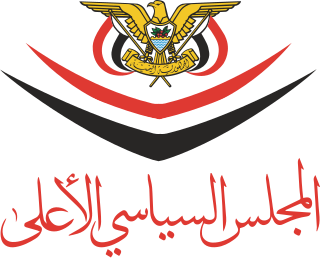
The Supreme Political Council is an extraconstitutional collective head of state and executive established in 2016 in Sanaa by the Houthi movement and the pro-Houthi faction of the General People's Congress (GPC) to rule Yemen opposed to the Presidential Leadership Council (PLC) in Aden. The SPC carries out the functions of head of state in Yemen, appointing the country's cabinet and managing the Yemen's state affairs in a bid to fill in political vacuum during the Yemeni Civil War. The Council aims to outline a basis for running the country and managing state affairs on the basis of the constitution. Since 2018 the SPC has been headed by Mahdi al-Mashat as Chairman of the Council.
Since 2016, a food insecurity crisis has been ongoing in Yemen which began during the Yemeni civil war. The UN estimates that the war has caused an estimated 130,000 deaths from indirect causes which include lack of food, health services, and infrastructure as of December 2020. In 2018, Save the Children estimated that 85,000 children have died due to starvation in the three years prior. In May 2020, UNICEF described Yemen as "the largest humanitarian crisis in the world", and estimated that 80% of the population, over 24 million people, were in need of humanitarian assistance. In September 2022, the World Food Programme estimated that 17.4 million Yemenis struggled with food insecurity, and projected that number would increase to 19 million by the end of the year, describing this level of hunger as "unprecedented." The crisis is being compounded by an outbreak of cholera, which resulted in over 3000 deaths between 2015 and mid 2017. While the country is in crisis and multiple regions have been classified as being in IPC Phase 4, an actual classification of famine conditions was averted in 2018 and again in early 2019 due to international relief efforts. In January 2021, two out of 33 regions were classified as IPC 4 while 26 were classified as IPC 3.
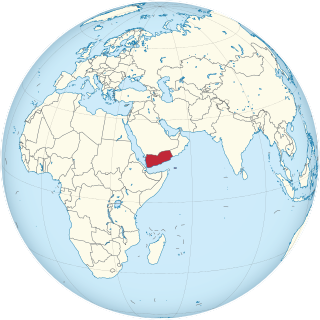
An outbreak of cholera began in Yemen in October 2016. The outbreak peaked in 2017 with over 2,000 reported deaths in that year alone. In 2017 and 2019, war-torn Yemen accounted for 84% and 93% of all cholera cases in the world, with children constituting the majority of reported cases. As of November 2021, there have been more than 2.5 million cases reported, and more than 4,000 people have died in the Yemen cholera outbreak, which the United Nations deemed the worst humanitarian crisis in the world at that time. However, the outbreak has substantially decreased by 2021, with a successful vaccination program implemented and only 5,676 suspected cases with two deaths reported between January 1 and March 6 of 2021.















